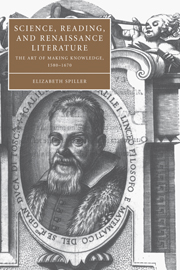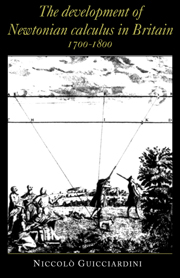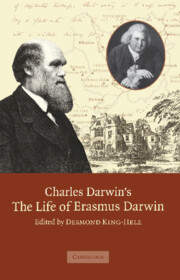Refine search
Actions for selected content:
10306 results in History of science: general interest

Science, Reading, and Renaissance Literature
- The Art of Making Knowledge, 1580–1670
-
- Published online:
- 22 September 2009
- Print publication:
- 27 May 2004

The Development of Newtonian Calculus in Britain, 1700–1800
-
- Published online:
- 14 September 2009
- Print publication:
- 07 December 1989
Scientific travel in the Atlantic world: the French expedition to Gorée and the Antilles, 1681–1683
-
- Journal:
- The British Journal for the History of Science / Volume 43 / Issue 1 / March 2010
- Published online by Cambridge University Press:
- 27 August 2009, pp. 1-17
- Print publication:
- March 2010
-
- Article
- Export citation

Charles Darwin's 'The Life of Erasmus Darwin'
-
- Published online:
- 26 August 2009
- Print publication:
- 10 October 2002
G. E. R. Lloyd, Cognitive Variations: Reflections on the Unity and Diversity of the Human Mind. Oxford: Clarendon Press, 2007. Pp. viii+201. ISBN 978-0-19-921461-7. £27.50 (hardback). 2009. ISBN 978-0-19-956625-9. £14.99 (paperback).
-
- Journal:
- The British Journal for the History of Science / Volume 42 / Issue 3 / September 2009
- Published online by Cambridge University Press:
- 24 August 2009, pp. 448-450
- Print publication:
- September 2009
-
- Article
- Export citation
Richard G. Olson, Science and Scientism in Nineteenth-Century Europe. Urbana and Chicago: University of Illinois Press, 2008. Pp. 349. ISBN 978-0-252-07433-2. £14.99 (paperback).
-
- Journal:
- The British Journal for the History of Science / Volume 42 / Issue 3 / September 2009
- Published online by Cambridge University Press:
- 24 August 2009, pp. 469-470
- Print publication:
- September 2009
-
- Article
- Export citation
Books received
-
- Journal:
- The British Journal for the History of Science / Volume 42 / Issue 3 / September 2009
- Published online by Cambridge University Press:
- 24 August 2009, pp. 474-477
- Print publication:
- September 2009
-
- Article
- Export citation
Jessica Riskin (ed.), Genesis Redux: Essays in the History and Philosophy of Artificial Life. Chicago and London: University of Chicago Press, 2007. Pp. xvii+389. ISBN 978-0-226-72081-4. £16.00, $25.00 (paperback).
-
- Journal:
- The British Journal for the History of Science / Volume 42 / Issue 3 / September 2009
- Published online by Cambridge University Press:
- 24 August 2009, pp. 437-438
- Print publication:
- September 2009
-
- Article
- Export citation
Peter M. Jones, Industrial Enlightenment: Science, Technology, and Culture in Birmingham and the West Midlands, 1760–1820. Manchester and New York: Manchester University Press, 2008. Pp. xii+260. ISBN 978-0-7190-7770-8. £55.00 (hardback).
-
- Journal:
- The British Journal for the History of Science / Volume 42 / Issue 3 / September 2009
- Published online by Cambridge University Press:
- 24 August 2009, pp. 462-463
- Print publication:
- September 2009
-
- Article
- Export citation
Liba Taub, Aetna and the Moon: Explaining Nature in Ancient Greece and Rome. Corvallis, OR: Oregon State University Press, 2008. Pp. xiv+138. $24.95. ISBN 978-0-87071-196-1 (hardback).
-
- Journal:
- The British Journal for the History of Science / Volume 42 / Issue 3 / September 2009
- Published online by Cambridge University Press:
- 24 August 2009, pp. 454-456
- Print publication:
- September 2009
-
- Article
- Export citation
Silvan S. Schweber, Einstein and Oppenheimer: The Meaning of Genius. London: Harvard University Press, 2008. Pp. xiv+412. ISBN 978-0-674-02828-9. £19.25 (hardback).
-
- Journal:
- The British Journal for the History of Science / Volume 42 / Issue 3 / September 2009
- Published online by Cambridge University Press:
- 24 August 2009, pp. 471-473
- Print publication:
- September 2009
-
- Article
- Export citation
Serafina Cuomo, Technology and Culture in Greek and Roman Antiquity. Cambridge: Cambridge University Press, 2007. Pp. xi+212. ISBN 978-0-521-00903-4. £15.99 (paperback).
-
- Journal:
- The British Journal for the History of Science / Volume 42 / Issue 3 / September 2009
- Published online by Cambridge University Press:
- 24 August 2009, pp. 451-453
- Print publication:
- September 2009
-
- Article
- Export citation
Francesca Bray, Vera Dorofeeva-Lichtmann and Georges Métailié (eds.), Graphics and Text in the Production of Technical Knowledge in China. Leiden and Boston, MA: Brill, 2007. Pp. xiii+772. ISBN 978-90-04-16063-7. $149.00, $199.00 (hardback).
-
- Journal:
- The British Journal for the History of Science / Volume 42 / Issue 3 / September 2009
- Published online by Cambridge University Press:
- 24 August 2009, pp. 450-451
- Print publication:
- September 2009
-
- Article
- Export citation
Hugh Trevor-Roper, Europe's Physician: The Various Life of Sir Theodore de Mayerne. New Haven and London: Yale University Press, 2006. Pp. xii+438. ISBN 0-300-11263-7. $35.00. £25.00 (hardback).
-
- Journal:
- The British Journal for the History of Science / Volume 42 / Issue 3 / September 2009
- Published online by Cambridge University Press:
- 24 August 2009, pp. 456-457
- Print publication:
- September 2009
-
- Article
- Export citation
Massimo Mazzotti (ed.), Knowledge as Social Order: Rethinking the Sociology of Barry Barnes. Aldershot: Ashgate, 2008. Pp. xi+184. ISBN 978-0-7546-4863-5. £50.00 (hardcover).
-
- Journal:
- The British Journal for the History of Science / Volume 42 / Issue 3 / September 2009
- Published online by Cambridge University Press:
- 24 August 2009, pp. 445-447
- Print publication:
- September 2009
-
- Article
- Export citation
BJH volume 42 issue 3 Cover and Back matter
-
- Journal:
- The British Journal for the History of Science / Volume 42 / Issue 3 / September 2009
- Published online by Cambridge University Press:
- 24 August 2009, pp. b1-b3
- Print publication:
- September 2009
-
- Article
-
- You have access
- Export citation
BJH volume 42 issue 3 Cover and Front matter
-
- Journal:
- The British Journal for the History of Science / Volume 42 / Issue 3 / September 2009
- Published online by Cambridge University Press:
- 24 August 2009, pp. f1-f2
- Print publication:
- September 2009
-
- Article
-
- You have access
- Export citation
Daniel Carey, Locke, Shaftesbury, and Hutcheson: Contesting Diversity in the Enlightenment and Beyond. Cambridge: Cambridge University Press, 2006. Pp. x+260. ISBN 978-0-5214-4502-1. £51.00 (hardback). - Sarah Irving, Natural Science and the Origins of the British Empire. London: Pickering and Chatto, 2008. Pp. xiii+183. ISBN 978-1-85196-889-3. £60.00 (hardback).
-
- Journal:
- The British Journal for the History of Science / Volume 42 / Issue 3 / September 2009
- Published online by Cambridge University Press:
- 24 August 2009, pp. 459-461
- Print publication:
- September 2009
-
- Article
- Export citation
James Delbourgo and Nicholas Dew (eds.), Science and Empire in the Atlantic World. New York: Routledge, 2008. Pp. xiv+365. ISBN 978-0-415-96127-1. £18.99 (paperback).
-
- Journal:
- The British Journal for the History of Science / Volume 42 / Issue 3 / September 2009
- Published online by Cambridge University Press:
- 24 August 2009, pp. 461-462
- Print publication:
- September 2009
-
- Article
- Export citation
William H. Brock, William Crookes (1832–1919) and the Commercialization of Science. Alderhot: Ashgate, 2008. Pp. xxi+556. ISBN 978-0-7546-6322-5. £65.00 (hardback).
-
- Journal:
- The British Journal for the History of Science / Volume 42 / Issue 3 / September 2009
- Published online by Cambridge University Press:
- 24 August 2009, pp. 465-466
- Print publication:
- September 2009
-
- Article
- Export citation
